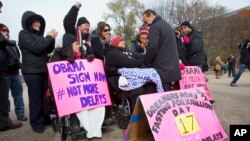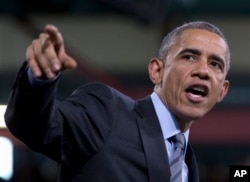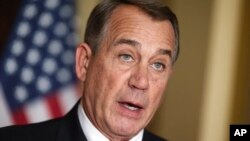Americans are split on whether President Barack Obama was right to take executive action to protect millions of illegal immigrants from deportation, according to a new poll. Quinnipiac University found 48 percent opposed to the president’s action while 45 percent supported it.
The survey also found that 48 percent of those surveyed believed undocumented immigrants should be allowed to stay in the country and offered a path to citizenship. That is down from 57 percent who supported it a year ago.
But the poll also suggests Republicans should be careful in how they respond to the president’s immigration order. Quinnipiac found that 68 percent oppose Congress shutting down the government as a way to block Obama’s action on immigration.
Long-term political impact
Looking ahead to the next two years, the president’s executive action on immigration has far-reaching political implications for both major parties and could become a central issue in the 2016 presidential campaign.
In defending his action in speeches around the country, Obama likes to remind voters that he took action mindful of the long-standing notion that the U.S. considers itself a nation of immigrants.
"It’s not what we look like," the president told a supportive crowd in Las Vegas, Nevada. "It’s not what our last name is. It’s not where we come from. It’s not how we pray. What makes us American is a shared commitment to an ideal that all of us are created equal, all of us have a chance to make our lives what we will."
Obama’s decision angered many Republicans who regard the action as a blanket amnesty for millions who came into the U.S. illegally. House Speaker John Boehner has promised a strong response, but he’s also been vague about what it might be and when it might come.
"The president had said before that he is not king and he’s not an emperor. But he’s sure acting like one and he’s doing it at a time when the American people want nothing more than for us to work together," Boehner said.
Delayed move
The president held off on his decision until after the midterm congressional elections, fearing any action before November would jeopardize several Senate Democrats engaged in tough re-election battles.
But Republicans swept nearly all the close races and will have a majority in the Senate beginning in January.
American University analyst James Thurber said it appears the president decided he had nothing left to lose politically and fulfilled his promise to act on immigration in the face of congressional gridlock over reform.
"He is obviously thinking, 'well, the Republicans haven’t done anything and they probably won’t do anything’” on immigration, Thurber said. "'I’m going to get criticized for this anyway but I want to do the right thing, it will be part of my legacy and I’m going to go ahead and do this.' "
Awaiting the Republican response
The short-term political price could be steep, especially since Republicans will control both chambers of Congress next year, said Matt Dallek, an assistant professor of political management at George Washington University.
"I think what you are going to see is a series of kind of aggressive acts on the part of the Republican Congress that attempt to send a message that they think that this action is unconstitutional," he said.
Some conservative House members have raised the prospect of blocking funds to implement the president’s initiative on immigration. One of the leading opponents of immigration reform in the House, Iowa Republican Steve King, has also raised the possibility of trying to censure the president, a sort of official reprimand or rebuke by Congress.
Republicans could also go to federal court to try to stop the president’s executive action, but Brookings Institution scholar Thomas Mann predicted that would be an uphill legal battle.
"It is not easy for Republicans in Congress to take action that would deny him the ability to implement his own executive order or to take to the courts because the courts have largely upheld this kind of discretionary authority by presidents," Mann said.
Whatever they decide to do in response, Republican pollster Whit Ayres said members of his party need to be careful not to offend Hispanic voters who are a growing constituency in U.S. presidential elections.
"We got one-third of the Hispanic vote. We’ve got to do better with Hispanics, with Asians," Ayres said. "We’ve seen that coming. It is not arguable and it is simply the challenge that we have to meet successfully if we will ever elect another president."
Obama’s legacy
Obama’s willingness to act alone on immigration also signals a sharper focus on the judgment of history in his final two years in office, said author Aaron David Miller, a recent guest on VOA’s Press Conference USA program.
"Well, I think this president – in the far fewer than 1,000 days that remain in his presidency – is going to be looking to shore up whatever his legacy is going to be at home and abroad," Miller said.
The Quinnipiac poll also showed Obama’s approval rating at only 39 percent, a troubling omen for Democrats as Republicans prepare to take over both chambers of Congress in early January.















